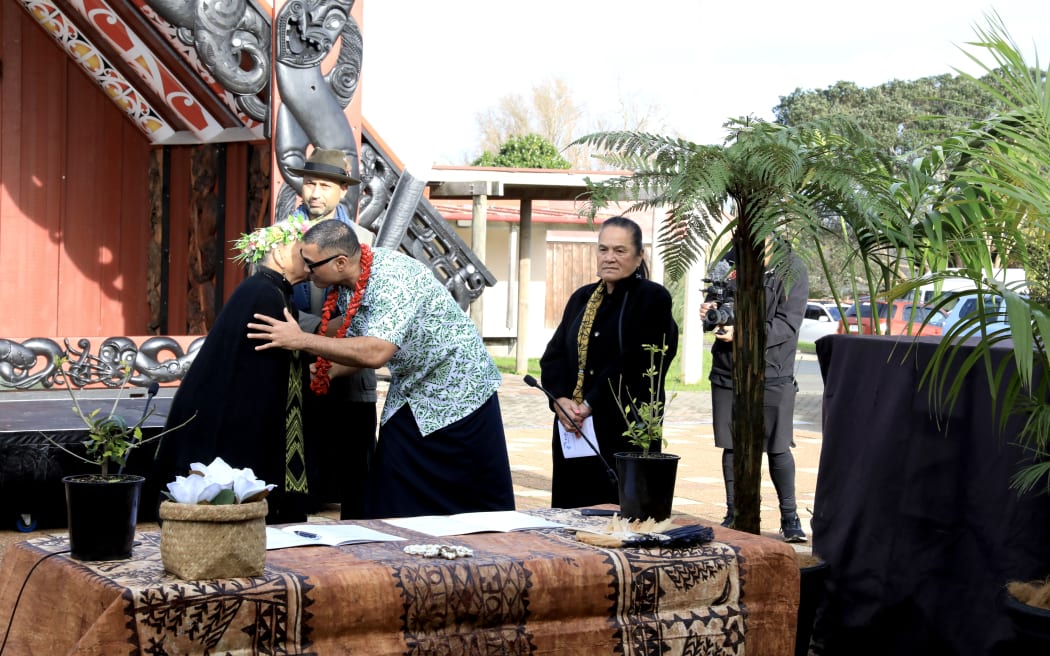Pasifika were raided in the lead up to the historic Dawn Raids apology
Wednesday 17 May 2023 | Written by RNZ | Published in New Zealand, Regional

Pacific community representatives and Ngāti Whātua Ōrākei have gathered in Auckland to mark the one-year anniversary of the Dawn Riads Apology in August 2022. Photo: RNZ / Marika Khabazi/23051614
RNZ Pacific can reveal Immigration New Zealand (INZ) was conducting out of hours compliance visits to private residents otherwise known as 'dawn raids' while the government was preparing for the historic Dawn Raids apology.
"It's disgusting, I'm appalled to hear that they were dawn raiding just prior to making an apology for Dawn Raids. To me that smacks of insincerity on behalf of the government," Tongan community leader Pakilau Manase Lua said.
"All of them were people of colour. That smacks of racism," he added.
An out of hours visit is characterised as before 7am or after 9pm.
In figures released to RNZ, INZ has confirmed there were three visits between July 1, 2020 and June 30, 2021.
Seven people were found in those visits; four Chinese, one Malaysian, and two Fijians.
The new figures were requested after questions were raised as to why INZ uses these tactics following a visit to the house of a Tongan national on April 19.
The man's lawyer described it as reminiscent of tactics used in the 1970s Dawn Raids.
An INZ spokesperson said they understand the impact the historic Dawn Raids had on Pacific peoples and the trauma from them remains with the community today.
They said it is conducting a review into out-of-hours compliance visits, and until further notice, INZ will not be conducting any such visits.
The review is expected to be completed by the end of June.
The government continues to review advice on whether or not it should implement an amnesty or regularisation initiative for overstayers, the Immigration Minister said.
Michael Wood told RNZ Pacific he was looking to give clarity on the matter soon but would not give a firm date.
"This is a complex issue so we're making sure we're taking the time to fully consider the logistical challenges, possible precedents it would set, and issues of fairness around who would be included and those who have already self-deported, for example," Wood said.
Apology never went far enough
The visits happened in the year leading up to the government's formal apology for the wrongdoings of the 1970s.
University of Auckland senior law lecturer Dylan Asafo said it represented a culture of racism in New Zealand.
"In which Pacific peoples were seen as commodities who could be exploited for labour and when they were no longer able to be exploited they were immediately deported," Asafo said.
The apology never went far enough, he said.
"The Dawn Raids apology in 2021 was completely superficial.
"It wasn't actually intended to change government practices, racist practices which target Pacific peoples, it was only meant to benefit the government to essentially make them look good," Asafo said.
The former Pacific Peoples' Minister Aupito William Sio, who led the apology, said the apology still stands.
Pakilau Manase Lua, who led a recent community meeting in light of the latest raids, feels otherwise after learning early morning visits are still happening.
"The dawn raids in the 70s were racist and it looks like it continued even just prior to the apology and even right up to today we had a recent case," Pakilau said.
He has been calling for change for years now.
Involved with two petitions, one with 22,000 plus signatures and a second one with the same focus on pathways to residency which has over 11,000 signatures.
Pakilau said both were lodged together.
‘Suffering in silence’
While the government and its agencies work through processes, families are still living in fear.
"Suffering in silence, because they are scared about what will happen to them and their families," Asafo said.
Asafo wants to see a complete overhaul of the immigration system.
"Otherwise we'll continue to keep having discriminatory racist policies, whether it be dawn raids [or] barriers to permanent residency for ethnic minorities," Asafo said.
But June Ranson, who is a licensed immigration advisor and CEO of woven international, believes the overhaul has already taken place in the form of this year's immigration reset.
"I'm of the considered opinion that with the new regulation policy there are a lot more safeguards for overstayers," she said.
Ranson said if INZ staff were doing their job correctly it would not give rise to more overstayers and heartbreak could be avoided.
She said every country has its rules and "we can't just open the flood gates".
But both Asafo and Ranson agree that every situation is different and overstayers are vulnerable to being exploited.
An overstayer who would like his identity protected said he needs help and wishes to have permanent residency so he can have the same opportunities as other contributing members of NZ society.
"I just heard from heaps of people about their [INZ] answer because all their answer is to go back to Tonga, but when they go back to Tonga they are stuck in Tonga.
"I just need a chance so I can bring over my kids," the anonymous overstayer said.
Ranson's advice to overstayers stuck in limbo while the authorities work through processes is to do things right.
"Clean the slate and get your life sorted out, get proper advice, not just from your mates. I've had clients myself that have been in the situation and in the long run it's worked out fine."
"They can't go on living like this. It would be hell," she said.
- Lydia Lewis, RNZ Pacific Journalist














































